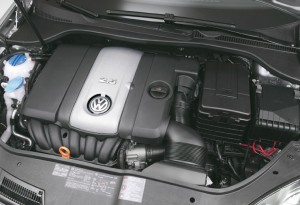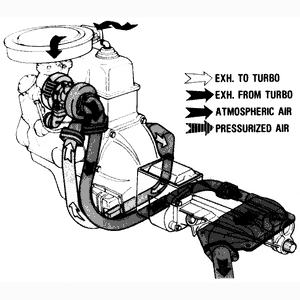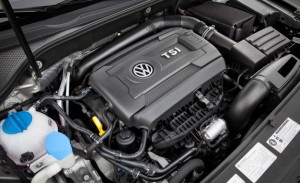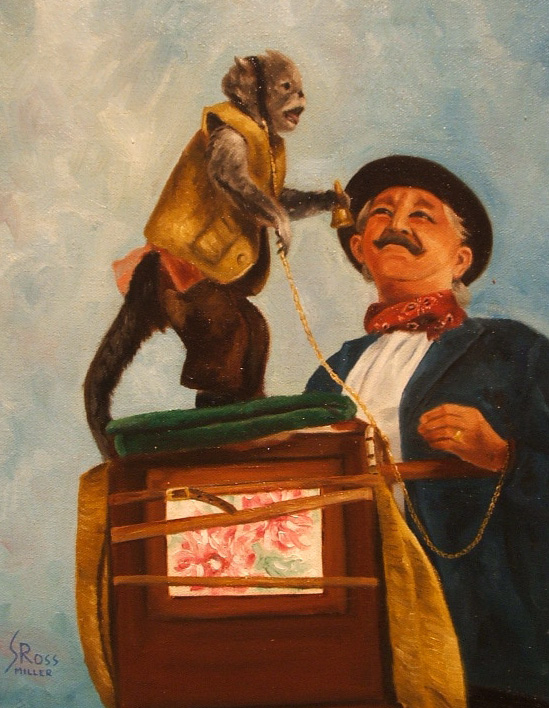This week, in addition to the ’15 Honda Fit, I also have a ’14 Passat – equipped with the last of the inline fives.
This engine – 2.5 liters, 170 hp – is in the process of being phased out. Its replacement is VW’s turbo four – 1.8 liters but making the same 170 hp, while delivering quicker acceleration (due to the turbo engine’s stronger low-end torque) and better fuel economy: 24 city, 35 highway (with manual transmission) vs. 22 city, 32 highway – also with the manual.
So – am I sad to see it (the inline five) go?
I dunno.
Turbo engines have their pros – and their cons. Of course, so do non-turbo engines – but they are different pros and cons.
A turbo temporarily boosts the output of an engine, so the car accelerates more quickly when quicker acceleration is wanted. But when the driver doesn’t need more scoot than what’s necessary to maintain the car’s momentum (i.e., steady state cruising) the engine – which is typically smaller than would otherwise be necessary to deliver acceptable on-demand acceleration – delivers better fuel economy.
The turbo’d engine is also usually stronger-feeling at lower engine speeds (RPMs) because the turbo boosts low-end torque output. Therefore, it is less necessary to gun the engine to get the car moving.
Then there are the cons:
Turbos stress an engine because the air/fuel charge is forced into the engine under pressure (boost). Hence the engine must be built stronger, which often means – costs more to build.
Turbos themselves are expensive, too. And it’s not just the turbo. It’s the whole system – including the turbo’d car’s specialized exhaust system (turbochargers work like water wheels at an old-timey flour mill; an impeller is caused to turn by the passing exhaust stream, which turns a shaft with a compressor wheel, which pressurizes the incoming air). If the turbo craps out on you, the bill will be high. As in several thousand dollars high.
It’s less fuel efficient (and performance isn’t quite as good as what you get with the 1.8 liter turbo engine). But, it’s simpler – and will probably last a long time, costing you not much to keep. There is no turbo to crap out on you; the exhaust piping is like what you’d find in any other modern car.
How much is that extra dollop of acceleration – about 3/4-1 second quicker to 60 in the Passat – and the 2-3 MPG uptick in fuel efficiency worth to you?
There are intangibles. And then there are the tangibles. The ’14 Passat with the 2.5 liter five stickers for $20,845 to start. To VW’s credit, you can buy the same trim Passat (the S) with the turbo four for $20,995 – a price difference that’s about what you’d spend to have a nice meal at a decent steakhouse.
So, color me pleased.
VW is effectively giving you the upgraded engine – and the upticked performance/mileage. These days, a rare – and commendable – thing.
As to the turbo’d longevity issues – so far, I know of none. VW has been putting the same basic ‘plant into other VWs for several years – and there are a bunch of them in circulation. Methinks turbo technology – and long-haul reliability have come a long way and – not to worry.
The Passat is an excellent car – a pick of the litter in its class. (Read the full-length review here.) I have no hesitation recommending it strongly – and have nothing bad to say about the fade-away of the in-line five.
Sometimes, retirement is just what the doctor ordered.
Throw it in the Woods?
PS: Thanks to all who’ve supported the site financially this month (and last).













The turbo is the weakest part of the TDI drivetrain. Most of the posters on TDIfourums.com with over 200K have had to have the turbo replaced.
Hi Eric,
Yeah. That would worry me… how much is a new/rebuilt turbo? I’d guess it’s at least $2k and maybe more.
Scroll down on this page for a scan of a dealer invoice… OUCH!
http://forums.tdiclub.com/showthread.php?t=285844
But looking at my engine, the turbo is fairly accessible and could be a DIY job if you have the time and knowledge.
Eric, I have priced turbo’s and they’re not nearly as expensive aftermarket. Some rebuilders give you money for your old ones, just like reman injectors. For the most part I guess it’s hard to compare pickups and cars when it comes to replacing parts since most pickups(GM’s for the most part but Dodge too)are good for half a million miles before things really get worn out all over. A friend replaced the injectors on his Dodge Cummins last year for a cost of a bit less than 3K. He thought it was a good deal since he had over 330,000 miles and the truck was still in good shape, just needed new injectors. And it wasn’t like it was laying down on him, just lost power and mileage. The engine itself was fine. I’d agree with him about that being a good deal. Take it to the dealer for those same repairs though and you’d definitely want to trade.
Good to know, Eight – thanks for looking into it!
If the turbo lasts for say 150,000 miles then the replacement/rebuild costs are not objectionable in my book.
eric, inquiring minds and all that. Being an old turbo guy, my first turbocharging manual dates back to ’71 or ’72 with lots of input from some of the old names in the game. I checked out some sites for TDI turbos and came up with a Garrett replacement aftermarket that retails for $1050. It’s a big improvement over the factory though. I’ll just paste a bit of what is listed under their description.
Garrett GT1749V VW TDI (Golf, Jetta, New Beetle) Upgrade Turbocharger
Fits:
1.9L TDI – BEW-code:
2003.5-2006 A4, New Beetle TDI
2003.5-2006.0 A4 Golf
2003.5-2005.0 A4 Jetta
The Garrett® GT1749V is the first performance upgrade / replacement turbocharger available to the Aftermarket for Volkswagen 1.9L TDI BEW Engines. The GT1749V comes equiped with a smart actuator, an industry exclusive, and a position sensor, which enables the turbocharger to communicate automatically with the Engine Control Unit (ECU). The kit is easy to install and suitable as a performance upgrade or replacement turbocharger. The Garrett VW TDI Kit also promotes a longer turbo and engine life span and increased reliability by lowering exhaust gas temperatures.
Includes the Latest Technology Tailored to Your Diesel Performance Needs:
Garrett® patented Variable Nozzle Turbine (VNTTM) design
GT wheel aerodynamics
Featuring:
Increased compressor flow over stock
Can support up to estimated 175hp
Turbine, compressor and oil connections fit with no modifications
Includes smart actuator with position sensor (separate EGR adaptor tube required)
Highest performance, durability and reliability in the industry
Replaces:
Volkswagen OE Part Numbers: 038 253 019 S & 038 253 014 E Model: KP39 (3K)
Nice find. That’s good to know.
The Passat TDI is nice though. 35MPG in mixed driving, torque-ey as hell and turbo. Yum
The TDI’s my favorite, too.
The V-6 is nice, but thirsty.
Love the electric motor/right-now torque of that TDI!
Oh, the joys and woes of turbos.
I have an ’09 Sportwagen TDI. A few weeks ago the check engine light sent me to my neighborhood mechanic. It gave him an indeterminate “Turbo” reading, and he suggested I should take it to the dealer. Diagnosis – a faulty ‘turbo boost sensor.’ $400 part and $300 labor to replace, but it was not an option, because because it would not get out of its own way as is. They also told me to be glad the sensor was now a separate part. Originally failure meant replacement of the entire turbo – they said $1400 parts and did not tell me the labor cost.